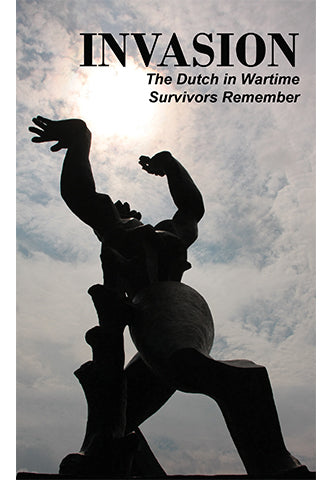Dutch the store
Invasion
Couldn't load pickup availability
The Dutch in Wartime: Survivors Remember is a series of books with wartime memories of Dutch immigrants to North America, who survived the Nazi occupation of The Netherlands.
Book 1: Invasion, covers the five days in May 1940 when an unsuspecting Dutch nation was brutally overrun by invading Nazi troops.
Designed and written to be easily accessible to readers of all ages and backgrounds, these books contain important stories about the devastating effects of war and occupation on a civilian population.
Edited by Tom Bijvoet.
89 pages
Historical background, 2 maps and 31 wartime memories.
ISBN: 978-0-3968308-0-8
On the cover: ‘Destroyed City’, sculpture by Osip Zadkine commemorating the bombing of Rotterdam. (Photo: Ilya de Milde)
READ AN EXCERPT:
We gave them fresh tomatoes
Tuesday May 14th, 1940 was a beautiful warm spring day. It was just after Pentecost and it was the fifth day after the invasion by the Germans. In the early afternoon Rotterdam was bombed by the German Air Force with devastating effects. For the population this bombing came like a lightning bolt out of a blue sky. From Bleiswijk, where I lived, the circling airplanes were clearly visible and we could hear their drone as well as the explosions of the bombs. Smoke spread over the city as the fires spread. The cloud of smoke and flames rose higher and higher into the sky. It is difficult to describe such an enormous fire. It raged for many days, the sun disappeared and became an orange globe and the stench of the fire was overpowering. Ash rained down until the inferno was well past its height. Because the main water pipeline was hit by bombs the Rotterdam Fire Department was powerless and hence the resulting damage was enormous.
Within an hour after the bombing a great stream of dazed fleeing people appeared in Bleiswijk, just north of Rotterdam. The only thing that we could do was offer them a glass of water, because our town had its own water supply, and fresh tomatoes from the hothouses near the town. We did this for hours on end. Most of the fleeing people had lost all of their possessions and were desperate. Some were still running. From where they ran they knew, but they had no idea where they were going to.
At that time I went to school in Hilligersberg, a suburb of Rotterdam and a few weeks after the bombing our school reopened, but in subsequent years going to school in a normal way did not happen again. As the school itself was occupied by German troops and used as barracks, the classes were divided over a number of other buildings, including a church.
In the summer of 1940 I often wandered in the cheerless debris of a once proud city, a pitiful ruin of bricks and misery.
Dirk Hoogeveen
Regina, Saskatchewan

